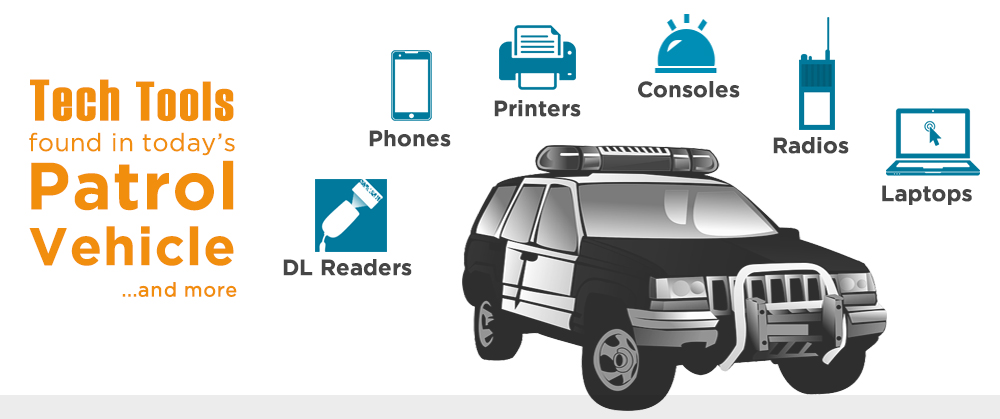To prevent distraction, a critical element is the modification of work practice controls to ensure you’re using technology and other tools as safely as possible.
A “work practice control” (sometimes referenced as an “engineering” or “administrative control”) is a procedural modification that reduces risk and/or exposure while on-the-job by altering how a particular task is performed and how various tools are used to accomplish task(s).
Our most recent white paper titled ‘At the Intersection of Situational Awareness and Technology,’ discusses the technology found in the 21st Century patrol car and how to use this technology while maintaining a ‘situational awareness’ mindset. Officer Safety is the most important part of your job.

Follow best practices to ensure Officer Safety. Follow these 6 Tips to Prevent Distracted Patrol:
Be wary of information overload.
Is there such thing as too much information? There is a limit to the amount of information you can digest at any given time. If you are overloaded with information or bombarded by triggers such as beeping, scrolling screens and dashboards, you can fall victim to decision paralysis or dull your perceptive abilities. Be careful with multi-tasking!
Maintain line-of-sight & “watch your six”.
With known or potential hazards, body positioning is key – keeping your head up and your eyes on the hazards around you (person, traffic, or other threats) can mean the difference between a good day and your last day. Be sure the technology you use can be utilized while maintaining line-of-sight and use all of your senses to scan your surroundings as often as possible.
[Watch] an Officer’s Safety Tip here.

Avoid tachypsychia.
You may have heard of tachypsychia when learning about self-defense or close quarters combat; tachypsychia is the psychological condition that affects a person’s perception of time/space when under extreme stress, exertion, or stimulation. In combat, tachypsychia is a good thing since it can slow the perceived passage of time and improve response – when using technology, however, tachypsychia can induce tunnel-vision, reduce peripheral vision, and alter the user’s perception of time as well. If you’ve ever lost track of time while on your mobile device or computer, you have experienced this!
Don’t get too comfortable.
Similar to our previous tip on tunnel vision and tachypsychia, getting over-comfortable in your patrol car or when using technology can result in distractions. Improve your level of self-awareness by assessing your level of stress (too much or too little can affect situational awareness) and remain vigilant at all times.
Be extra cautious at night or in adverse conditions.
Bright screens destroy night vision and can cause fatigue. If you must use your computer at night, turn the brightness down as much as possible to mitigate some of the negative effects on your vision. Learn more, read 5 Tips to Enhance a Situational Awareness Mindset.
Don’t get caught using a piece of equipment or technology you aren’t familiar with.
This isn’t an excuse to close your laptop or neglect the tools your department expects you to use, but is a reminder to always train on new equipment regularly (this includes when systems, hardware or software is updated or modified) and be diligent when building proficiency with a tool. Fixation and preoccupation are killers; the worst mistake you can make is letting your guard down because you failed to practice and familiarize yourself with new technology!
We hope that you found the 6 Tips to Prevent Distracted Patrol helpful. If you have additional tips to share, please mention us on Twitter @LTronCorp or share with us on Facebook.
Interested in learning more about this topic? View a [Webinar]: Distracted Patrol: Managing the 21st Century Technology Tightrope, hosted on Officer.com.
*Sign in or register on Officer.com to view the webinar.